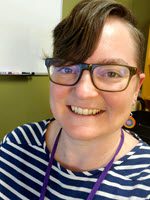
No Comments on DCT Librarian Selector & LBA Member Profile: Rian Debner, MA, MLIS, AHIP 46
Rian Debner, MA, MLIS, AHIP
University Librarian
University of Western States
Editor’s note: This month, we are celebrating Rian Debner, who has served as a Librarian Selector for Doody’s Core Titles since 2020 and joined the Doody’s Library Board of Advisors in 2023.
Where do you currently work and what is your position?
I work as the University Librarian at the University of Western States (UWS) in Portland, Oregon. UWS is a small graduate-level health sciences university with programs in chiropractic, clinical nutrition and functional medicine, sports medicine, sports and performance psychology, clinical mental health counseling, and naturopathic medicine.
Provide a brief description of your library and its services.
The library serves the students and faculty of the University of Western States by providing evidence-based information resources and reference services with an anytime, anywhere, and everywhere ethic. We facilitate student success and whole-person health by providing auxiliary materials to help support students’ study and health needs (e.g., chargers, iPads, laptops, white boards and markers, magnifying readers, foam rollers, and full-spectrum lights). We have a robust resource sharing program and student-focused library staff dedicated to meeting students where they are with information needs.
When did you start in health sciences librarianship? What was your position? With what institution?
I started my work in health sciences librarianship as an allied health liaison librarian when I was a faculty librarian at Mt. Hood Community College. In particular, I worked closely with our Nursing, Dental Hygiene, and Physical Therapist Assistant programs. I also co-taught a credit-bearing information literacy course for the Mental Health, Social Service, and Addiction Counseling program.
Name two of the most important issues facing the profession today.
The ubiquity of and access to AI technologies. How do libraries, their vendors, and their institutions use AI in ethical, responsible ways to improve processes and to support the work of staff? How do we ensure that our students, faculty, administrators, and other stakeholders understand appropriate and ethical uses of AI? How do we ensure that students are learning what they need to be prepared for clinical practice?
With tight budgets everywhere, it is challenging to balance out access to subscription-only, evidence-based resources with user expectations that everything is freely available online without any access restrictions. It seems that libraries are caught between the tensions of providing unfettered and immediate access to the research resources that faculty and students want (a just-in-case model) and the pragmatics that we cannot provide access to absolutely everything our researchers could need. How can we provide resources “just in time” or on-demand when users expect that to mean instantaneous access?
What is one innovation, product, or service in your library that you’re excited about?
I am particularly proud of two service areas of our library that showcase our user-focused values: our robust resource sharing program and our outreach and engagement services. Despite our small size, our resource sharing program has been nationally recognized for its excellence, and our resource sharing team is regularly commended by students in our biennial student survey. Our outreach and engagement services have a two-pronged approach: (1) work to engage faculty, program directors, and deans with the library, to support program and curriculum needs, and (2) efforts to engage and include students, to make them feel welcomed and supported in the library, and to underscore that the library is here for them, both physically and virtually.
Why do you volunteer with Doody’s as a Librarian Selector and Board Member?
As the person who does collection development for our library, I rely on Doody’s Core Titles to help with title selection, so it also feels important for me to give back what is functionally a community-created resource. When the former library dean at UWS was mentoring me into my current position, she highlighted the importance of taking over her role as a Librarian Selector, to be able to cover topics in complementary and integrative health care. Being able to represent these areas in a broader community of medical librarians is also a reason that I volunteered to serve on the Library Board of Advisors.


Leave a comment